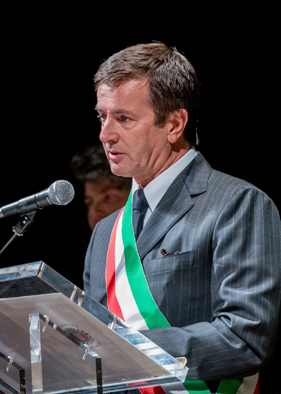February 2019, Year XI, no. 2
Giorgio Gori
You’ve got to be crazy…
"I’m not saying you’ve got to be crazy to want to be Mayor (as Massimo Cacciari some time ago claimed in an interview), but it isn’t too far off the mark."
Telos: Every time someone talks about the direct election of the Prime Minister, people use the very evocative expression “Mayor of Italy”.
So, is it true that a mayor has, in the administration of his or her own city, more power than the Prime Minister has today?
Giorgio Gori: More power, I really don’t think so: although in this government the figure of the Prime Minister seems to have been scaled down significantly compared to the past. Maybe mayors are closer to people and to the problems. It might also be easier for them to come up with solutions given how familiar mayors need to be with the context. But being mayor is anything but simple: just think that the former Mayor of Forlì Roberto Balzani wrote a book a few years ago on his experience in city administration and called it Five Years of Solitude . I also came from many years of experience as a manager and I worked really hard to adjust to a system made up of a dense network of laws, codes and red tape, which often slow down activities and problem solving considerably. There are a lot of problems, economic resources aren’t always booming, the administrative apparatus doesn’t always adapt quickly to the hectic dynamics of our times… It’s a great job, which requires total commitment… I’m not saying you’ve got to be crazy to want to be mayor (as Massimo Cacciari some time ago claimed in an interview), but it isn’t too far off the mark.
The breakdown in the party system has likely been the source of people’s widespread anti-political sentiment. And yet this gap between citizens and politics is not nearly as wide when it comes to the Mayor. Are you still able to get your citizens passionate about politics?
I live in a city with 120 thousand people, a size that really fosters the meeting between the citizens, everyday problems and their Mayor. The people of Bergamo see me walking down the street, they walk by under the windows of my office every day and not only do I share the same space as they do, I also share their problems and their hopes. I think this really closes the gap between the institution and citizens and helps curb that anti-political sentiment which has now gained a foothold in our moment in history. Then again, the Mayor isn’t a true politician: he’s an administrator, which is far different from a pure politician. We are much closer to the problems and much more inclined to find solutions. I think this is a crucial factor.
Almost 5 years have gone by since you were elected in June 2014, supported by the centre-left parties. According to a 2016 survey, you are the most popular Mayor in Italy, with an extremely high level of confidence, as much as 62.6%. What were the main points in your government programme and which have you managed to achieve in creating what you have defined the “Bergamo model”?
I think Bergamo is a city that’s got problems but is a positive model for Italy, made up of efficiency, vision and the desire to solve problems. The people from Bergamo are very proud of their city, and they are unusually attached to it. It’s the same for us and we’ve always worked thinking that things could be done better in our city than in any other city in Italy.
In these five years, our signature style has been to tackle problems head-on, all the problems our city has always suffered from. We’ve resolved issues that had been pending for years, for decades, precisely because of our determination in how we’ve dealt with things, dedicating ourselves to this job full-time and without holding back. And the city felt involved in it, it worked with us during this transformation process: in the area of urban planning alone, by the end of our administration, projects will have been launched to renew 340 thousand square metres of the city, an investment of over 257 million euros. Or public wi-fi: we’re one of the Smartest European cities from this point of view, with over 130 hotspots, smart benches, fibre optics in the elementary and middle schools.
We’ve made Bergamo into a reception model and have managed to translate this into a concrete experiment - that’s truly unique - with the Accademia per l’Integrazione [Integration Academy], a school that helps asylum seekers while their requests are being considered by the local commissions by teaching them Italian, providing training and volunteer work. This is a model that can be replicated in any city in Italy. Caritas and Confindustria have been working with us on it and the results have been significant. And we could still talk about a lot of other things: about schools open in the afternoons, with projects open to neighbourhoods, and participatory security, with neighbourhood watch groups and the 1SAFE app, about innovation in services for citizens and much, much more. So, when we say the “Bergamo model” that’s what we’re talking about: a city that’s able to grow, to come up with innovative solutions, to open up to the world, that works all together to become more attractive.
Last October you let go of your reservations and declared, “I’m willing to run again for Mayor”. Elections will be held on 26 May, along with the ones for the European Parliament. Why did you decide to do this?
They said you have to be crazy to be a Mayor. Maybe I’m crazier than I thought…but seriously, one of the reasons is precisely to continue the experience of that Bergamo model I claim is so effective: if we managed to continue doing what we’ve been doing since 2014 for another 5 years, our city would take a really big step forward. We had a vision of how we wanted our city to be in 2014, which first we pursued, then built with a lot of hard work and determination. Like every good, purebred person from Bergamo, I can’t leave things half finished.
Marco Sonsini
Editorial
Giorgio Gori, Mayor of Bergamo, is kicking off what we at PRIMOPIANOSCALAc hope will be a long series of interviews with Italian and foreign mayors.
We would like to start by thanking Mayor Gori, not just for his immediate willingness, but also for reminding us of two invaluable things that have contributed to helping us understand the role, tasks, commitment and essentially the life a Mayor, worthy of respect, leads.
We are referring to the book by the former Mayor of Forlì, Roberto Balzani, a political and administrative history scholar, entitled ‘Five Years of Solitude: Useless memoirs of a Mayor’ and the provocative (as usual) interview with Massimo Cacciari, in 2016, for the Italian daily newspaper La Repubblica, where the former Mayor of Venice asserts that “The Mayor is a universal lightening rod. He’s on top of the house, and if it gets hit by a bolt of lightning, it hits him.” And when asked what it means to be a Mayor today, Cacciari answers, “You’ve got to be crazy.”
That may even be true but in our opinion, being Mayor, both in the past and today, means being able to handle the burdensome responsibility of saying either “yes” or “no” to a specific thing.
And in the case of mayors, these things are very well defined; meaning that they are decisions that impact each of our daily lives immediately and in a way that may be immediately judged.
Mayors cannot shirk this decision-making responsibility, they cannot say “yes” to everybody: the common good of the city is not equal to the sum of all the individual benefits.
Gori tells us that “there are a lot of problems, economic resources aren’t always booming, the administrative apparatus doesn’t always adapt quickly to the hectic dynamics of our times.”
People and local areas have more needs and these needs change quickly: old age, poverty, immigration, unemployment, depopulation, school dropout, public transport, waste collection, emergencies that are multiplying. So, it’s important to surround yourself with people with adequate expertise: an administration that is able to explain - it’s impossible for the Mayor to know everything - the cause and effect relationship between a resolution and reality, what the potential procedural stumbling blocks are between a decision and its implementation: essentially, the inevitable time frames and red tape of bureaucracy.
His experience as a manager, says Gori, certainly didn’t prepare him to deal with this system.
With all due respect to those who claim the Mayor has to be a manager!
First of all, however, the Mayor must be a governance expert, knowing how to make the wheels of the public machine turn.
The Mayors have to be smart politicians, able to get their citizens involved in making the effort needed to find solutions to problems.
The expression Gori used to show certain goals had been achieved - “the city felt involved” - reflects just what breed of politician he is.
After describing a job that is so complex and demanding it makes your hands shake, what does Gori decide to do?
To run again for Mayor. Why? Because like any purebred person from Bergamo, he doesn’t like to leave things half finished.
One last thing. In this series on Mayors, we’ve decided to come up with some rather unique covers. We’re going to portray something the city is known for, without however resorting to humdrum postcard-type images. Then we’re going to associate a popular saying with this image, in the local dialect, if possible.
For Bergamo, we’ve chosen Harlequin, the city’s costume, which legend has it comes from a poor area of Bergamo. The saying is: “The Personality of people from Bergamo: they rarely flare up, but are smouldering beneath the ashes”, which seems to perfectly describe these extraordinary people, people who rarely make a fiery show of things but beneath the ashes harbour embers that are always burning.
Mariella Palazzolo

Giorgo Gori is the Mayor of Bergamo. In 2014 he won the primaries and became the mayoral candidate for the Democratic Party.
During the election, after he got the most votes in the first round, with 45.48%, he managed to defeat former centre-right mayor Franco Tentorio in the runoff, restoring the leadership of the Democratic Party in Bergamo, Lombardy.
Yet he comes from a different professional background. During university he immediately began working as a journalist.
His first job was at Radio Bergamo, at the time directed by Vittorio Feltri. Afterwards, he moved to Eco di Bergamo and then Bergamo Oggi.
Once he’d stopped working as a journalist, in 1984 Gori began working in the television industry. He started working for Rete 4, mentored by Carlo Freccero. After Fininvest acquired the company in 1988, he was in charge of the programme schedule for the three networks. In 1991 he became the director of Canale 5. Then in 1997 went to work as the director of Italia Uno. Finally, in 1999 he went back to Canale 5. In 2001 he reached another professional turning point: he founded the TV production company Magnolia, which he later left, giving up all his appointments and shares, in 2012: the year he entered politics. After enrolling in the Democratic Party in 2011, Gori was engaged as Matteo Renzi’s spin doctor. After becoming the Mayor of Bergamo, his next step was to try to scale the Pirelli tower: he ran as a candidate for the centre-left in the Regional elections in Lombardy in 2018 and was defeated by the centre-right candidate, Attilio Fontana.
Gori was born in Bergamo, is 58 years old and graduated in architecture. In 1995 he got married for the second time to TV journalist Cristina Parodi, with whom he had three children: Benedetta, Alessandro and Angelica.
Marco Sonsini







SocialTelos